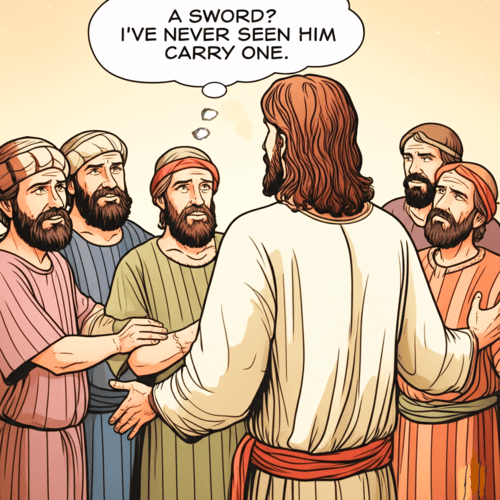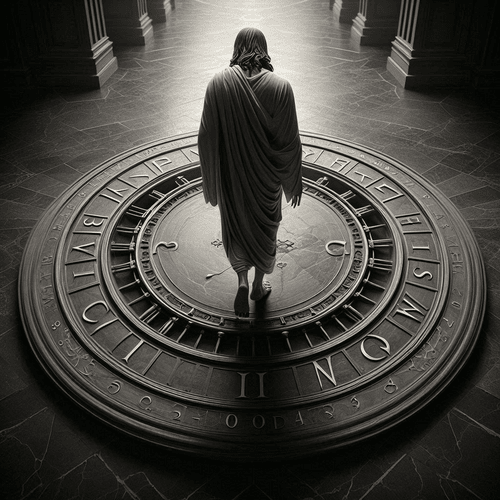What Did Jesus Mean: ‘I Bring Not Peace But a Sword’?
Jesus’ statement may sound perplexing to us at first read: “Do not think that I have come to bring peace to the earth. I have not come to bring peace, but a sword” (Matthew 10:34). After all, the declaration seems to contradict everything we know about Jesus as the Prince of Peace. How can the same Saviour who blessed peacemakers and commanded us to turn the other cheek also claim to bring division and conflict?
The apparent contradiction has troubled believers and even provided ammunition for critics who argue Christianity promotes violence. However, when we examine the passage in light of the context and of Scripture, we discover Jesus’ words reveal a profound truth about the nature of His mission and the cost of discipleship.
‘NOT PEACE BUT A SWORD’: UNDERSTANDING THE CONTEXT
To properly interpret Jesus’ startling declaration, we must first understand when and why He spoke these words. The statement occurs in Matthew 10, where Jesus is commissioning the 12 disciples for their first missionary journey. He’s not delivering a sermon to curious crowds or teaching in comfortable synagogues—He’s preparing His followers for the harsh realities they will face as gospel messengers.
The entire chapter serves as a manual for discipleship, complete with warnings about persecution, family division, and suffering. Jesus tells His disciples they will be “hated by all for my name’s sake” (v. 22) and that “a person’s enemies will be those of his own household” (v. 36). This context is crucial because Jesus isn’t prescribing violence; He’s predicting the inevitable response to the gospel message.
The Reformed tradition has long emphasised Christ’s first advent was as the suffering servant, not the conquering king. He came to die for sins and establish His spiritual kingdom, knowing full well the mission would create division between those who accept His lordship and those who reject it.
THE NATURE OF THE “SWORD”
When Jesus speaks of bringing a “sword,” He’s using metaphorical language to describe spiritual division, not endorsing physical violence. The Greek word machaira can refer to a literal weapon, but given the context and Jesus’ consistent teaching on non-violence, it clearly represents the dividing effect of gospel truth.
Scripture supports this interpretation. Hebrews 4:12 describes the Word of God as “living and active, sharper than any two-edged sword, piercing to the division of soul and of spirit.” Similarly, in Luke’s parallel account, Jesus says, “Do you think that I have come to give peace on earth? No, I tell you, but rather division” (Luke 12:51). The “sword” is simply another way of describing this division.
Reformed theologians have historically understood th I I is division as inevitable given the doctrine of total depravity. Because all humanity is fallen and naturally hostile to God, the gospel message will always provoke opposition. When the light of Christ shines into darkness, it exposes sin and demands a response—either repentance or rejection. There is no neutral ground.
This understanding also flows from the Reformed concept of two kingdoms. Jesus rules over both a spiritual kingdom (His church) and allows earthly kingdoms to exist under His providence. The “sword” He brings operates in the spiritual realm, separating wheat from chaff, sheep from goats, believers from unbelievers.
HOW DIVISION LEADS TO TRUE PEACE
The division Jesus brings, though painful, serves a redemptive purpose in God’s sovereign plan. Like a surgeon’s scalpel that cuts to heal, the gospel’s divisive power ultimately leads to genuine peace.
- The division leads to individual peace with God. Romans 5:1 declares, “Therefore, since we have been justified by faith, we have peace with God through our Lord Jesus Christ.” Before anyone can experience true peace, they must be separated from their sin and reconciled to their Creator. This often requires painful separation from former ways of life, relationships, and priorities that conflict with following Christ.
- Though the gospel creates division in the present age, it points toward ultimate peace in the future. Jesus is indeed the Prince of Peace prophesied in Isaiah 9:6, but the fullness of that peace awaits his second coming. In the new heavens and new earth, all division will cease, and perfect harmony will reign under Christ’s righteous rule.
- Even in the present, believers experience a foretaste of this peace. Despite facing opposition from the world, Christians enjoy peace with God and unity with fellow believers that transcends earthly divisions. The same gospel that separates believers from unbelievers unites believers to one another across all ethnic, social, and cultural boundaries.
The Reformed tradition emphasises God’s sovereignty in using even opposition to accomplish His purposes. The early church’s growth through persecution (Acts 8:1-4) demonstrates how God can use the world’s hostility to spread the gospel. What appears to be defeat often becomes victory in God’s hands.
LIVING WITH THE SWORD TODAY
Understanding Jesus’ words has practical implications for believers today. We should expect opposition when we live faithfully as Christians. The gospel remains as divisive now as it was in the first century because human nature remains unchanged. When we proclaim Jesus is the only way to God, that all have sinned and need salvation, and that Christ demands total allegiance, we shouldn’t be surprised when some respond with hostility.
However, we must carefully distinguish between necessary gospel division and unnecessary offense. We’re called to speak truth in love, not to be needlessly provocative or uncharitable. The division should come from the gospel itself, not from our poor presentation of it.
We must also maintain love even toward those who oppose our faith. Jesus’ warning about division comes in the same chapter where he calls his disciples to be “wise as serpents and gentle as doves” (Matthew 10:16).
‘NOT PEACE BUT A SWORD’: THE HARMONY OF SCRIPTURE
Jesus’ declaration about bringing a sword doesn’t contradict his role as the Prince of Peace—it explains how that peace is achieved. True peace cannot coexist with sin and rebellion against God. Before healing can occur, infection must be exposed and removed. Before reconciliation is possible, the problem must be acknowledged.
The “sword” Jesus brings serves the ultimate purpose of peace. Through the necessary division between light and darkness, truth and falsehood, righteousness and sin, He creates the conditions for genuine, lasting peace. This is the narrow way that leads to life, and though the path is difficult, the destination is glorious.
In a world that values tolerance above truth and peace above righteousness, Jesus’ words remind us some divisions are not only inevitable but necessary. The Prince of Peace brings the sword not to destroy, but to save—cutting away everything that prevents true peace with God.
‘NOT PEACE BUT A SWORD’: RELATED FAQs
Did Jesus ever use actual violence during His earthly ministry? No, Jesus consistently rejected physical violence even when it seemed justified. When Peter drew his sword to defend Jesus in Gethsemane, Jesus commanded him to put it away, saying “all who take the sword will perish by the sword” (Matthew 26:52). The only “violent” act recorded is Jesus cleansing the temple, which was symbolic prophetic action rather than personal aggression. Contemporary Reformed theologian Kevin DeYoung emphasises Jesus’ entire ministry demonstrates the spiritual nature of His kingdom.
- How does Reformed theology today view Christian participation in just war? Most contemporary Reformed thinkers, following Augustine and Calvin, distinguish between individual Christian behaviour and governmental authority. While Christians are called to be personal peacemakers, theologians such as Albert Mohler and RC Sproul have argued governments bear the sword for justice (Romans 13:4). However, they stress this is entirely different from the spiritual “sword” Jesus brings through the gospel. The two kingdoms doctrine helps maintain this distinction.
- What about the Crusades and other historical Christian violence—doesn’t this vindicate Jesus’ “sword”? Reformed theologians universally condemn the Crusades and similar episodes as tragic misapplications of Christ’s teaching. John MacArthur and others argue these represent the dangerous conflation of earthly political power with spiritual kingdom advancement. The “sword” Jesus brings is never meant to coerce belief or establish earthly Christendom through force. Such actions directly contradict Jesus’ statement that His kingdom is “not of this world” (John 18:36).
How does this passage relate to persecution of Christians worldwide today? Reformed leaders like John Piper and Alistair Begg see modern persecution as direct fulfillment of Jesus’ prediction. The gospel continues to provoke opposition because it challenges worldly power structures and demands ultimate allegiance to Christ. They emphasise persecution often accelerates church growth, demonstrating God’s sovereignty in using opposition for gospel advancement, just as occurred in the early church.
- Does this teaching apply to family conflicts over faith? Yes, Reformed pastors frequently counsel believers struggling with family division over their conversion or faithful Christian living. Tim Keller and others emphasise that while we should pursue reconciliation and show love, we cannot compromise the gospel to maintain family harmony. The “sword” often cuts deepest in our closest relationships because these have the highest stakes and strongest emotional bonds.
- How do we interpret the “peace” that Jesus does give (John 14:27)? Reformed scholars like Sinclair Ferguson distinguish between the “peace as the world gives” and Christ’s peace. Jesus gives peace with God through justification, peace of conscience through forgiveness, and peace of heart through the Holy Spirit’s presence. This peace coexists with external conflict because it operates in the spiritual realm. DA Carson notes this peace actually enables believers to endure opposition without bitterness or fear.
What’s the relationship between this passage and Reformed views on evangelism? Evangelists such as Paul Washer emphasise faithful gospel preaching will always produce mixed results—some will believe, others will reject and oppose. They argue trying to make the gospel more “acceptable” to avoid division actually betrays Christ’s mission. The “sword” reminds us that conversion is God’s work through his Spirit, not human persuasion that eliminates all offense.
‘NOT PEACE BUT A SWORD’: OUR RELATED POSTS
Editor's Pick
SUPPORT US:
Feel the Holy Spirit's gentle nudge to partner with us?
Donate Online:
Account Name: TRUTHS TO DIE FOR FOUNDATION
Account Number: 10243565459
Bank IFSC: IDFB0043391
Bank Name: IDFC FIRST BANK






